Parenting is one of the most rewarding yet challenging tasks a person can take on. While every parent strives to do their best, it’s easy to fall into certain traps that can have long-term consequences for a child’s development. Often, these mistakes are subtle and may not seem significant in the moment, but over time, they can leave lasting impacts. From overprotecting your children to overemphasizing their grades, here are ten subtle parenting mistakes that can affect your child’s emotional and psychological growth.
1. Overprotecting Your Children

Parenting can be a delicate balance, and one of the most common mistakes is overprotecting children. While it’s natural to want to shield your kids from harm, doing so can inadvertently prevent them from developing the skills they need to navigate challenges on their own. Overprotective parents often hover, making decisions for their children, and stepping in too quickly when problems arise. This approach can lead to children growing up feeling ill-prepared to deal with difficult situations, and it may hinder their emotional growth and independence. Allowing children to make mistakes and experience natural consequences fosters resilience and confidence.
2. Using Love as a Bargaining Tool

Another subtle parenting mistake involves using love as leverage to manipulate behavior. Parents might say things like, “If you do this, I’ll love you more,” or “I’ll only love you if you get good grades.” This kind of conditional love can be damaging, as it creates an unhealthy environment where children feel they must earn affection or approval. It can lead to feelings of inadequacy or insecurity, and children may grow up with a distorted understanding of love. Unconditional love, where children are accepted and loved regardless of their actions, provides a solid foundation for healthy emotional development.
3. Overreacting to Their Mistakes
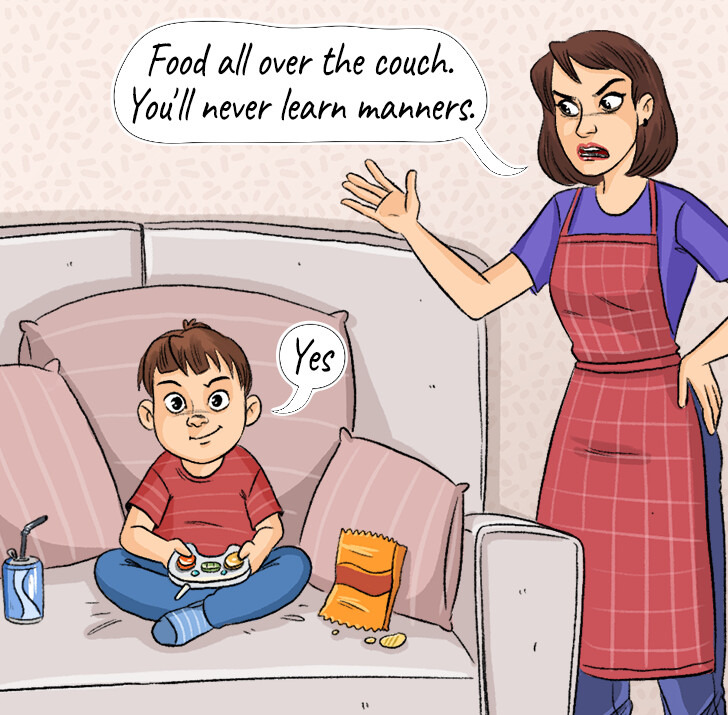
Children, like all humans, make mistakes. However, some parents tend to overreact when their child slips up, especially when the mistake is relatively minor. Overreacting, whether through anger, disappointment, or harsh punishment, can create a fear-based environment where children are reluctant to take risks or admit their mistakes. Instead, parents should view mistakes as opportunities for learning and growth. By maintaining a calm and measured response, you can help your child understand what went wrong and how to avoid repeating it, without causing undue stress or anxiety.
4. Overloading Their Schedules

In today’s fast-paced world, it’s common for parents to push their children to excel in multiple areas—school, extracurricular activities, sports, and social obligations. However, overloading a child’s schedule with too many commitments can lead to burnout, stress, and a lack of time for self-care and relaxation. It’s important to allow children the space to explore their interests and passions at their own pace, without the constant pressure to perform. Encouraging balance and downtime can help them maintain mental and physical well-being, which is essential for their overall growth and happiness.
5. Not Apologizing for Your Mistakes
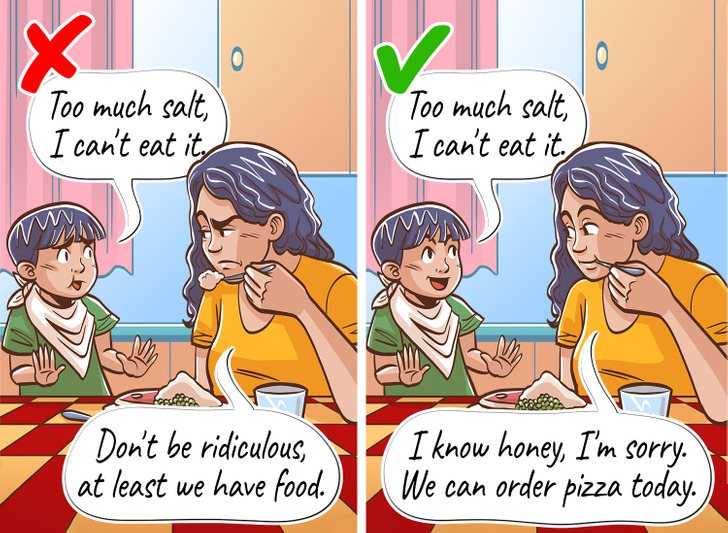
Parents are not infallible, and it’s important to model humility and responsibility for your children. When a parent makes a mistake, whether it’s losing patience, saying something hurtful, or making a poor decision, it’s crucial to apologize. Children learn by example, and if they see that their parents are willing to admit when they’re wrong, they are more likely to take ownership of their own actions. Not apologizing, on the other hand, can create a dynamic where children feel uncomfortable admitting their own mistakes, leading to a lack of accountability and difficulty in building healthy relationships.
6. Talking with Them Like They Are Your Friends

It’s natural to want to have a close and open relationship with your children, but treating them as if they are your friends rather than your children can lead to confusion about roles and boundaries. Parents are responsible for guiding, disciplining, and setting limits, which is different from the relationship one would have with a friend. While it’s important to nurture a supportive and loving connection, it’s also crucial to maintain an authoritative presence in the relationship. Children need structure and clear boundaries to feel safe and secure. Mixing up roles can cause children to test boundaries, leading to behavioral problems and confusion.
7. Changing Parenting Rules Depending on Your Mood
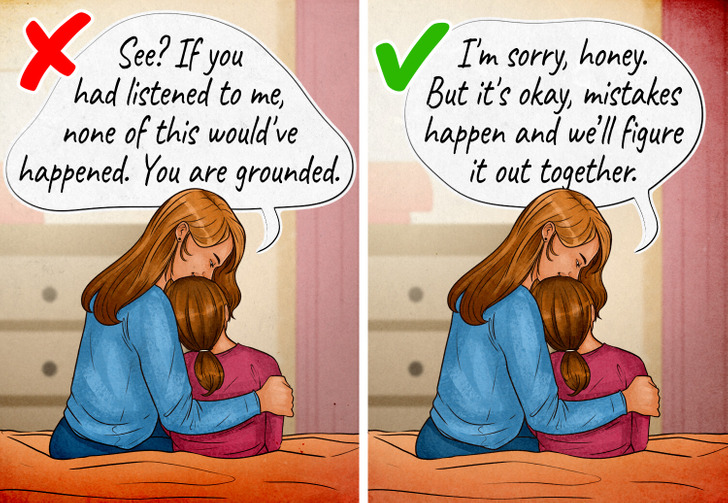
Consistency is key in effective parenting. When rules and expectations change based on a parent’s mood or emotional state, it sends mixed signals to the child, leaving them unsure of what is acceptable. Children thrive in environments where they know what to expect and what is expected of them. Sudden shifts in behavior or rules, especially when influenced by a parent’s mood, can lead to insecurity, anxiety, and frustration. It’s essential to set clear and consistent rules, and when they do need to be adjusted, do so thoughtfully and with clear communication.
8. Expecting Them to “Grow Up Fast”
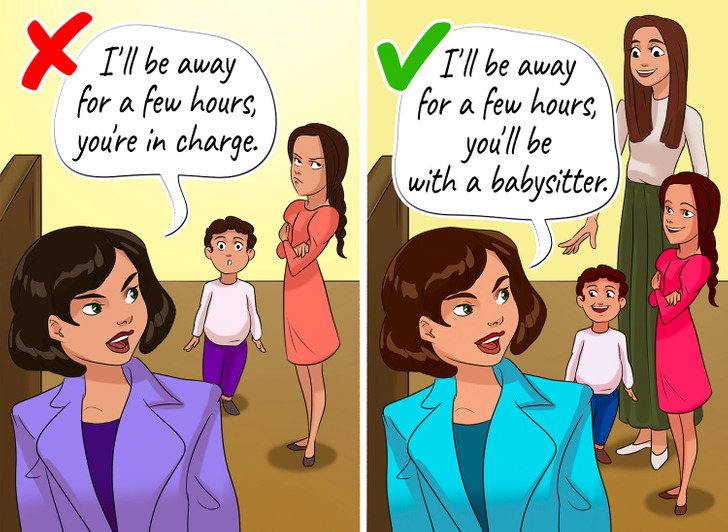
Every child develops at their own pace, and it’s important for parents to respect that. Expecting a child to “grow up fast” or pushing them to behave beyond their years can place unnecessary pressure on them. Whether it’s expecting them to take on adult responsibilities, suppress their emotions, or act in a way that isn’t appropriate for their age, these expectations can negatively affect their mental health and emotional development. Children need time to experience childhood and go through the natural stages of development. Being patient and understanding allows them to develop at their own pace, which is crucial for their emotional well-being.
9. Constantly Criticizing Their Friends
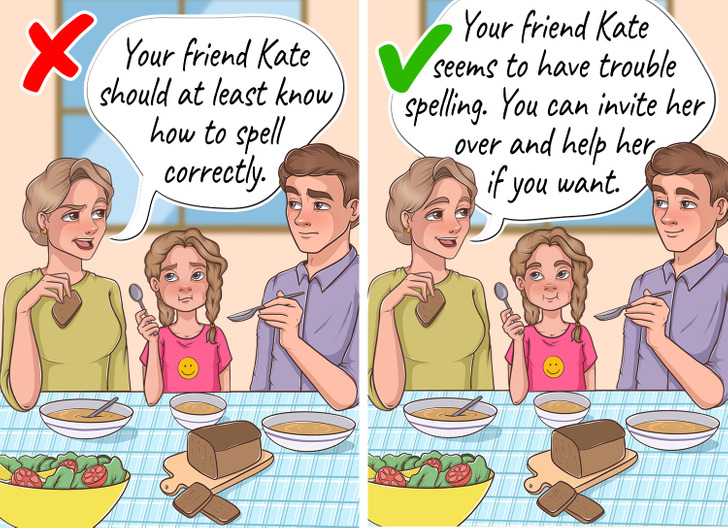
As parents, it’s natural to want the best for your children, and sometimes this may involve questioning their choice of friends. However, constantly criticizing or scrutinizing their friends can have a damaging effect on your child’s social life and self-esteem. If a parent is too critical of their child’s friends, the child may feel torn between loyalty to their friends and the desire to please their parents. It can also cause children to doubt their judgment, leading them to question their social interactions. Instead of focusing on the negatives, encourage your child to develop healthy friendships and use the opportunity to discuss positive qualities they should look for in others.
10. Overemphasizing Their Grades

Grades are an important part of a child’s education, but when parents place too much emphasis on academic performance, it can create undue stress and anxiety. Overemphasizing grades may make children feel that their worth is tied to their performance, rather than who they are as individuals. This can lead to perfectionism, fear of failure, and a lack of self-confidence. While it’s important to encourage academic achievement, it’s equally important to emphasize the value of effort, personal growth, and resilience. Encourage a love for learning and personal development, rather than focusing solely on the outcome of grades.
Conclusion
Parenting is a journey filled with learning, growth, and love. While no parent is perfect, being aware of these subtle mistakes can help ensure that children grow up feeling loved, supported, and capable of navigating the challenges of life. By fostering independence, encouraging resilience, and maintaining consistent boundaries, parents can help their children develop into well-rounded and emotionally healthy individuals. It’s crucial to remember that parenting is not just about guiding children through the present but also preparing them for a successful and fulfilling future.


